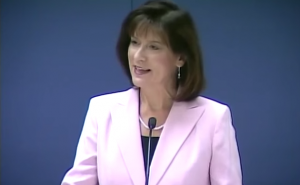Non Sequiturs: 02.17.19
* I share Allahpundit's take on the retirement buzz around Justice Clarence Thomas (recently discussed by Jeffrey Toobin, but also in the air at last November's Federalist Society conference): it's certainly possible, and if it happens, Judge Amy Coney Barrett and Judge Amul Thapar are the two top picks. [Hot Air] * And Judge Barrett is protecting her prospects for Supreme Court confirmation: she just joined the opinion of a fellow shortlister, Judge Diane Sykes, that dutifully applies Hill v. Colorado, the shaky but not-overruled Supreme Court precedent about free-speech rights outside abortion clinics. [Bench Memos / National Review] * Speaking of SCOTUS, which amici boast the best track recorders in filing certiorari-stage amicus briefs in business cases? Adam Feldman crunches the numbers -- and the dominance of the U.S. Chamber of Commerce should come as no surprise. [Empirical SCOTUS] * And speaking of the Chamber, it also seems to be making progress on its goal of forcing more disclosure of litigation-funding arrangements, with the reintroduction of the Litigation Funding Transparency Act (LFTA). [Institute for Legal Reform] * Litigation funders don't reflexively oppose any and all disclosure requirements; Michael German of Vannin Capital, for example, argues for a sensible and limited disclosure regime. [New York Law Journal] * If you're looking for an interesting new podcast (besides Wondery's exploration of the Dan Markel case), consider Bound by Oath from the Institute for Justice (Eugene Volokh is a fan). [Institute for Justice] * Should Roger Stone be gagged? Joel Cohen weighs the pros and cons. [The Hill] * Are you a lawyer who enjoys poker? Mark your calendar for February 23! [Attorney Poker Tour]

Judge Diane Sykes (via YouTube)
* I share Allahpundit’s take on the retirement buzz around Justice Clarence Thomas (recently discussed by Jeffrey Toobin, but also in the air at last November’s Federalist Society conference): it’s certainly possible, and if it happens, Judge Amy Coney Barrett and Judge Amul Thapar are the two top picks. [Hot Air]
* And Judge Barrett is protecting her prospects for Supreme Court confirmation: she just joined the opinion of a fellow shortlister, Judge Diane Sykes, that dutifully applies Hill v. Colorado, the shaky but not-overruled Supreme Court precedent about free-speech rights outside abortion clinics. [Bench Memos / National Review]

Early Adopters Of Legal AI Gaining Competitive Edge In Marketplace
* Speaking of SCOTUS, which amici boast the best track recorders in filing certiorari-stage amicus briefs in business cases? Adam Feldman crunches the numbers — and the dominance of the U.S. Chamber of Commerce should come as no surprise. [Empirical SCOTUS]
* And speaking of the Chamber, it also seems to be making progress on its goal of forcing more disclosure of litigation-funding arrangements, with the reintroduction of the Litigation Funding Transparency Act (LFTA). [Institute for Legal Reform]
* Litigation funders don’t reflexively oppose any and all disclosure requirements; Michael German of Vannin Capital, for example, argues for a sensible and limited disclosure regime. [New York Law Journal]
Sponsored

Legal AI: 3 Steps Law Firms Should Take Now

The Business Case For AI At Your Law Firm


Early Adopters Of Legal AI Gaining Competitive Edge In Marketplace

Is The Future Of Law Distributed? Lessons From The Tech Adoption Curve
* If you’re looking for an interesting new podcast (besides Wondery’s exploration of the Dan Markel case), consider Bound by Oath from the Institute for Justice (Eugene Volokh is a fan). [Institute for Justice]
* Should Roger Stone be gagged? Joel Cohen weighs the pros and cons. [The Hill]
* Are you a lawyer who enjoys poker? Mark your calendar for February 23! [Attorney Poker Tour]
 David Lat is editor at large and founding editor of Above the Law, as well as the author of Supreme Ambitions: A Novel. He previously worked as a federal prosecutor in Newark, New Jersey; a litigation associate at Wachtell, Lipton, Rosen & Katz; and a law clerk to Judge Diarmuid F. O’Scannlain of the U.S. Court of Appeals for the Ninth Circuit. You can connect with David on Twitter (@DavidLat), LinkedIn, and Facebook, and you can reach him by email at dlat@abovethelaw.com.
David Lat is editor at large and founding editor of Above the Law, as well as the author of Supreme Ambitions: A Novel. He previously worked as a federal prosecutor in Newark, New Jersey; a litigation associate at Wachtell, Lipton, Rosen & Katz; and a law clerk to Judge Diarmuid F. O’Scannlain of the U.S. Court of Appeals for the Ninth Circuit. You can connect with David on Twitter (@DavidLat), LinkedIn, and Facebook, and you can reach him by email at dlat@abovethelaw.com.
Sponsored

Navigating Financial Success by Avoiding Common Pitfalls and Maximizing Firm Performance








